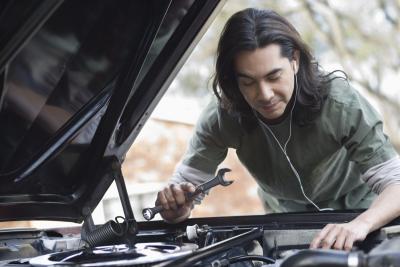
The Mercedes Benz E320 is a four-door sedan that is part of the executive E-Class range of vehicles. The E320 has been extremely reliable; however, this vehicle can experience a number of problems. If you experience complications when operating your E320, there are several things that you can do to troubleshoot the problem. These methods require little knowledge; you can identify the issue(s) through smell, noise and feel.
Move to where you are able to smell for a sulfurous odor coming from your engine and then examine your Mercedes Benz E320’s battery. Smelling this odor is often a sign that your battery is leaking electrolytes. Should the sulfurous smell persist while your Mercedes Benz E320’s engine remains running, you definitely need to examine your engine's exhaust system as well as its fuel systems to ensure that there is no damage to any of the components. If you have determined that the battery is the trouble, visit your local auto parts store and purchase a new battery.
Examine your Mercedes Benz E320’s ring set beside the head gasket. If you notice any strong, burned gas smell coming from the engine, the Mercedes Benz E320's piston rings have likely deteriorated, or its head gaskets are cracked; both of these situations can cause the leakage. You can resolve or minimize this issue by adding lubricating spray. Utilize specialized lubricant to spray around the piston rings and head gaskets; the spray can loosen and reverse damage from years of wear and tear and make the parts functional again. Unfortunately, if the lubricating spray doesn't work, you will need to replace the Mercedes Benz E320's engine.
Smell underneath your hood by popping the hood and taking a whiff immediately as the hood opens after the car has traveled several miles. You will be checking for an odd metallic odor. If you detect the smell, your clutch-bearing system may be burned out and requiring urgent attention. Often, after an E320 has been driven for several years or exceeds 100,000 miles, the clutch-bearing system starts to degrade due to the extreme heat from the friction of operating the vehicle. The extensive heat causes lubricants to evaporate within the system and prevents the E320 from accelerating smoothly. The odd metallic smell coming from the engine could also be the front wheel spindle rubbing against the rims and drums of the Mercedes Benz E320; that is a normal occurrence when running over potholes and obstacles while driving. Seek out a mechanic to determine for sure where the smell is coming from.
Listen closely to your Mercedes Benz E320’s front as well as rear wheels. Listen for any strange noises like the sounds of metal scraping. A sound like this can suggest there is an issue with the braking system, especially if the sound happens whenever you apply pressure to the brakes. You will definitely have to replace your brake pads, as a Mercedes Benz E320 is designed to alert the driver that the brake pads have been worn down once a metallic tab encounters the brake rotor. Take your E320 immediately to an auto repair shop or purchase brake pads for replacement.
Pay attention to any hissing or popping sound as you drive. Hissing or popping sounds are usually an indication that your muffler has a hole in it. The hissing or popping sound occurs as your muffler is working hard to push out hot air while cool air is entering via the hole. Your E320's horsepower will drop and make the car’s acceleration sluggish. Change the muffler right away.
Listen for any grinding or clanking metal sounds coming from beneath the hood. After 100,000 miles, the Mercedes Benz E320 has a tendency to exhibit transmission difficulties that can require repair or even replacement.
Obtain a feel for the way the car is running and be alert for any shaking, abrupt lunges or unexpected pauses in acceleration.
Ensure your Mercedes Benz E320’s alignment is in sound condition, because tires that aren't properly balanced tend to make Mercedes Benz E320 veer to the left or the right. You may think you are driving straight, but the slight variation in alignment can cause the car to veer. Unbalanced tires place a great deal of stress on the engine by making it work harder. Check your tires by putting a penny between the tire treads; you'll know immediately that the tires are in need of changing if you are able to see President Lincoln's head above the treads. Take your Mercedes Benz E320 to a professional front-end alignment services shop.
Check if your shock absorbers are worn out; if they are, your Mercedes Benz E320 will shake or shudder. Shock absorbers allow your E320 to handle the road more easily and provide a smoother drive. The Mercedes Benz E320's manual suggests that an owner needs to replace the shock absorbers about every 150,000 miles.